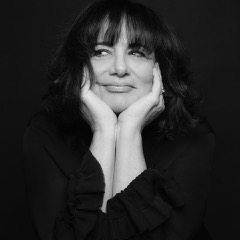Club Review: Helane Blumfield and Bobby Peaco in “Me and Bobby P”
Bobby Peaco was one of the stalwarts of New York piano bars and cabaret for decades. His talent, wit and antic spirit livened up many of the city’s classic venues until a few years ago when he decided to move to Florida with his husband. He made a rare and welcome return to the cabaret stage as music director and co-star of Me and Bobby P at Don’t Tell Mama with singer Helane Blumfield, directed by Lennie Watts. The two met at a cabaret getaway in Italy long ago and have been partnered on shows since. I caught the final show of a four-show run.

The show opened, naturally, with a few lines from “Me and Bobby McGee” (Kris Kristofferson), leading into “I Just Dropped In (to See What Condition My Condition Was In) (Mickey Newbury). This was a surprising and welcome flash from the past; it was a hit for The First Edition which introduced the world to Kenny Rogers. The duo did not just do a simple call back but took the song on its own value and made the words relevant to the show and to their storytelling. Blumfield’s deep, throaty vocal blended well with Peaco’s throwaway rock delivery as he tossed out hilarious asides at the ends of lines. She was clearly in a low-key, bluesy comfort zone that seemed at times to be almost a character voice rather than her own. This impression was strengthened with a medley of Chris Smither’s “Love Me Like a Man” and Randy Newman’s “You Can Leave Your Hat On” in which she was broadly insistent and seductive in counterpoint to her partner’s self-aware, mock-sexy delivery that was a constant source of smiles and laughter.
By the time of her first solo number, “Ex’s and Oh’s” (Dave Bassett, Elle King), the red-hot mama delivery had been diluted by repetition into an, at best, a luke-warm mama. I began to wonder what Blumfield would sound like without the imposed and somewhat out of character affectation. She seemed satisfied to give a cursory, surface presentation of a hit song rather than investing it with reimagined energy and drive. Peaco’s first solo was especially welcome as he dusted off a song from the film Nashville, “It Don’t Worry Me” (Keith Carradine) with a relaxed honky-tonk delivery of both vocals and piano that was perfect. It was a clear reminder of the many fun-filled piano bar nights over which he used to preside.
To celebrate her love of Italy and her fateful meeting with her music director, Blumfeld donned a scarf-kerchief and sunglasses and a weak accent, and introduced “Gina,” a character she used to pretend to be on the subway as she fled her home and presented herself as a figure of mystery and romance. This was odd because, remaining in the get-up, she proceeded to sing a duet with Peaco as Helane and not Gina. The song, “Cinema Italiano” (Maury Yeston, from Nine) was a mistake on many levels—loud and unfunny and not flattering to either voice. A dark, angular take on Cole Porter’s “Too Darn Hot” coupled with Melody Gardot’s “Your Heart is Black as Night” seemed to exist just for its arrangement, rather than the arrangement existing to illuminate the songs. The intriguing Porter song on its own offered a promise that the Gardot did not deliver. Blumfield fared better with Carrie Underwood’s “Before He Cheats” (Josh Kear, Chris Tompkins) but the phrasing was too amorphous for it to be totally successful. A more specific, conversational tone would have let the dramatic beats in the song pay off.

The spoken introduction to Sheryl Crow’s “Redemption Day” gave it a contemporary, socio-political underpinning but the singers did little to elevate the less than anthemic song. It was an unfortunate misfire done in by awkward phrasing. The humor that had informed and lightened the first half of the show seemed to be evaporating. Next came a pairing of Irish singer-songwriter Andrew John Hozier-Byrne’s “Take Me to Church” with Neil Diamond’s “Holly Holy” which was, I suppose, tangentially related to the Crow song, but in performance it offered little other than some obvious attempts to “raise the roof” which failed to succeed. There was no discernible personal connection to either performer as they got bigger and bigger within the arrangement, like pushing too much air into a balloon.
Blumfield finally revealed herself in “Wild Horses” (Mick Jagger, Keith Richards) and her commitment to the storytelling and her dramatic, yet conversational delivery were thrilling. Where had this singer been hiding all evening? There was not one false choice and Peaco gave her just what she needed and not a note or a measure more. The next song, “Because the Night” (Bruce Springsteen, Patti Smith), worked well but the first half was in the same emotional and dynamic moment as the preceding number, so it took a while to kick in. It was greatly helped by Peaco’s dramatic counterpoint. The pianist then spoke of his long relationship with the legendary nightlife fixture Dawn Hampton as a lead-in to his solo on their heartwarming collaboration, “New Orleans Louisiana Blues.” One couldn’t help but smile at the classic Americana sound and the pianist’s obvious affection for his departed writing partner. That smile, happily, turned into bubbling laughter on “Don Juan” (Jerry Leiber, Mike Stoller) which was funny but would have worked even more if some of Peaco’s masterful clowning and razor-sharp timing had rubbed off on Blumfield in their time together.
“Sex Bomb” (Mousse T., Errol Rennalls) was an off-the-wall choice that succeeded on the element of surprise and the exuberant performances. Leonard Cohen’s “Tower of Song” might have been a good closer, but while building to a climax, the emotional emptiness of the delivery did it in. An encore proved to be another instance of an arrangement in search of a message. With Peaco offering a stark reworking of “What a Wonderful World” (Bobby Thiele, George David Weiss) against Blumfield’s overwrought, melodramatic “Boulevard of Broken Dreams” (Green Day: Mike Dirnt, Tré Cool, Billie Joe Armstrong), the messages were not only competing but seemed to be battling. I did not get it.
Director Lennie Watts directed with efficiency and an eye toward the inventive visuals that filled the show using the full stage and the piano in surprising ways. I wish a bit more time had been spent on what was presented within those visuals. I did like the recurring quotes from “Me and Bobby McGee” used as connective tissue throughout the show. Helane Blumfield and Bobby Peaco clearly had a great time working together; they communicated that delight at every turn but too often in the evening their choices prevented the audience from joining in.
###
Presented at Don’t Tell Mama on June 3 & 4, August 2 and 3, 2022.
About the Author
Gerry Geddes has conceived and directed a number of musical revues—including the Bistro- and MAC Award-winning "Monday in the Dark with George" and "Put On Your Saturday Suit-Words & Music by Jimmy Webb"—and directed many cabaret artists, including André De Shields, Helen Baldassare, Darius de Haas, and drag artist Julia Van Cartier. He directs "The David Drumgold Variety Show," currently in residence at Manhattan Movement & Arts Center, and has produced a number of recordings, including two Bistro-winning CDs. He’s taught vocal performance at The New School, NYU, and London’s Goldsmith’s College and continues to conduct private workshops and master classes. As a writer and critic, he has covered New York’s performing arts scene for over 40 years in both local and national publications; his lyrics have been sung by several cabaret and recording artists. Gerry is an artist in residence at Pangea, and a regular contributor to the podcast “Troubadours & Raconteurs.” He just completed a memoir of his life in NYC called “Didn’t I Ever Tell You This?”




